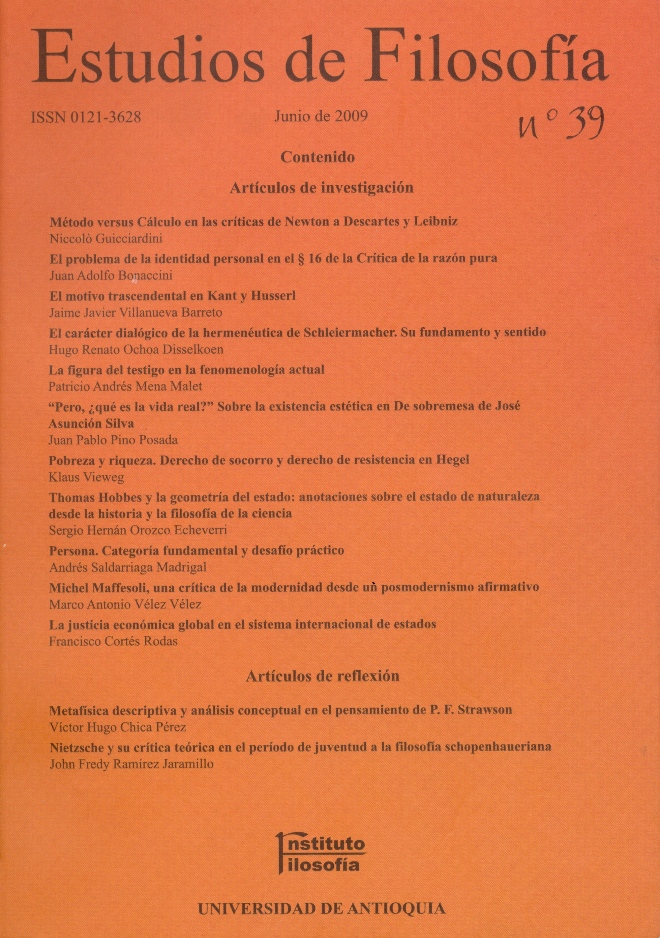Method versus calculus in Newton's criticisms to Descartes and Leibniz
DOI:
https://doi.org/10.17533/udea.ef.12672Keywords:
17th Century, philosophy of mathematics, Newton, Descartes, LeibnizAbstract
In this paper I will consider Newton’s views on mathematical method. Newton never wrote extensively about this issue. However, in his polemic writings addressed against Descartes and Leibniz he expressed the idea that his method was superior to the ones proposed by the French and the German. Considering these writings can help us in understanding the role attributed to algebra and calculus in Newton’s mathematical thought.
Downloads
References
BOS, H. J. M., Redefining Geometrical Exactness: Descartes ’Transformation of the Early Modern Concept of Construction. Springer-Verlag, New York, Berlin, Heidelberg, Tokyo, 2001.
COHEN, I. B. The Newtonian Revolution. Cambridge University Press, Cambridge, 1980.
DESCARTES, R. The Geometry of René Descartes with a Facsimile of the First Edition Ed. por D. E. Smith y M. L. Latham. Dover, NewYork, 1954.
GALUZZI, M., “I marginalia di Newton alla seconda edizione latina della Geometria di Descartes e i problemi ad essi collegati”, in: Belgioioso, G., Cimino, G., Costabel, P., Papuli, G. (eds.) Descartes: il Metodo e i Saggi. Istituto dell’Enciclopedia Italiana, Roma 1990, 387–417.
GUICCIARDINI, N. Reading the Principia: the Debate on Newton’s Mathematical Methods for Natural Philosophy from 1687 to 1736. Cambridge University Press, Cambridge, 1999. DOI: https://doi.org/10.1017/CBO9780511524752
GUICCIARDINI, N. Isaac Newton on mathematical certainty and method. MIT Press, Cambridge, Mass., 2009. DOI: https://doi.org/10.7551/mitpress/9780262013178.001.0001
HALL, A. R. Philosophers at War: the Quarrel between Newton and Leibniz. Cambridge University Press, Cambridge, 1980. DOI: https://doi.org/10.1017/CBO9780511524066
JONES, Alexander (ed.). Pappus de Alejandria. Book 7 of the Collection. Sources in the History of Mathematics and the Physical Sciences. Springer-Verlag Berlin and Heidelberg GmbH & Co. K., 1986.
LEIBNIz, G.W. Leibnizens mathematische Schriften, 7 Vols. Olms, Hildesheim, 1971.
NEWTON, I. The Principia: Mathematical Principles of Natural Philosophy. Traducción de I. Bernard Cohen y Anne Whitman con la asistencia de Julia Budenz, precedida de A guide to Newton’s Principia por I. Bernard Cohen. University of California Press, Berkeley, Los Angeles, London, 1999.
NEWTON, I., Philosophiae Naturalis Principia Mathematica. The Third Edition (1726) with Variant Readings. Ed. Alexandre Koyré and I. Bernard Cohen, con la asistencia de Anne Whitman. Cambridge University Press, Cambridge, 1972.
NEWTON,I. The Correspondence of Isaac Newton, 7 Vols. Ed. by H. W. Turnbull et al. Cambridge University Press, Cambridge, 1959–1977.
NEWTON,I. The Mathematical Papers of Isaac Newton, 8 Vols. Ed. por Derek T. Whiteside. Cambridge University Press, Cambridge, London, New York, 1967–1981.
NEWTON, I., The Mathematical Works of Isaac Newton, 2 Vols. Ed. por Derek T. Whiteside. Johnson Reprint Corp., NewYork, London, 1964–1967.
PANZA, M. Newton et les Origines del’Analyse: 1664–1666.Blanchard, Paris 2005.
PASINI, E. Il Reale e l’Immaginario: la Fondazione del Calcolo In nitesimale nel Pensiero di Leibniz. Sonda, Torino, 1993.
SHAPIRO, A., Fits, Passions, and Paroxysms: Physics, Method, and Chemistry and Newton’sTheories of Colored Bodies and Fits of Easy Reflection. Cambridge University Press, Cambridge, 1993.
SMITH, G. E., “The methodology of the Principia”, in: Cohen, I. B. and Smith, George E. (eds.) The Cambridge Companion to Newton. Cambridge University Press, Cambridge, 2002, pp. 137–173.
STEIN, H. “Newton’s metaphysics”, in: Cohen, I. B. and Smith, George E. (eds.) The Cambridge Companion to Newton. Cambridge University Press, Cambridge, 2002, pp. 256–307. DOI: https://doi.org/10.1017/CCOL0521651778.009
WESTFALL, R. S., Never at Rest: a Biography of Isaac Newton. Cambridge University Press, Cambridge, 1980. DOI: https://doi.org/10.1017/CBO9781107340664
Downloads
Published
How to Cite
Issue
Section
Categories
License
Copyright (c) 2009 Niccolò Guicciardini

This work is licensed under a Creative Commons Attribution-NonCommercial-ShareAlike 4.0 International License.
Authors who publish with this journal agree to the following terms:
1. The Author retains copyright in the Work, where the term "Work" shall include all digital objects that may result in subsequent electronic publication or distribution.
2. Upon acceptance of the Work, the author shall grant to the Publisher the right of first publication of the Work.
3. The Author shall grant to the Publisher a nonexclusive perpetual right and license to publish, archive, and make accessible the Work in whole or in part in all forms of media now or hereafter known under a Creative Commons Attribution-NoCommercia-ShareAlike (CC BY-NC-SA 4.0), or its equivalent, which, for the avoidance of doubt, allows others to copy, distribute, and transmit the Work under the following conditions: (a) Attribution: Other users must attribute the Work in the manner specified by the author as indicated on the journal Web site;(b) Noncommercial: Other users (including Publisher) may not use this Work for commercial purposes;
4. The Author is able to enter into separate, additional contractual arrangements for the nonexclusive distribution of the journal's published version of the Work (e.g., post it to an institutional repository or publish it in a book), as long as there is provided in the document an acknowledgement of its initial publication in this journal;
5. Authors are permitted, and Estudios de Filosofía promotes, to post online the preprint manuscript of the Work in institutional repositories or on their Websites prior to and during the submission process, as it can lead to productive exchanges, as well as earlier and greater citation of published work (see The Effect of Open Access). Any such posting made before acceptance and publication of the Work is expected be updated upon publication to include a reference to the Estudios de Filosofía's assigned URL to the Article and its final published version in Estudios de Filosofía.















